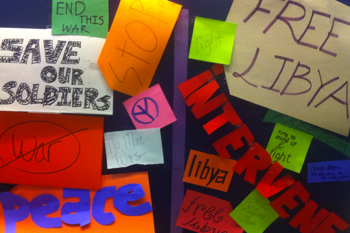 By Jung-Ju Lee, Mill Creek High School, Grade 11
By Jung-Ju Lee, Mill Creek High School, Grade 11
May 23, 2011
In February of 2011, Libyan dictator Muammar Gaddafi resorted to military coercion and the dissolution of human rights in response to a series of peaceful demonstrations advocating democratic elections, which were threatening his 40-year regime. The protests immediately evolved into a full-scale armed rebellion as the conflict between the armed forces and anti-Gaddafi rebels escalated to violent confrontations.
With the increasingly-agitated calls for aid by the opposition, the United Nations was faced with a dilemma that left it with only two options: to refuse to provide aid and be criticized for abandoning the oppressed Libyans or to act and be criticized for prompting military action. The United Nations has decided to act, but its measures are restricted by the Resolution of 1973 that prevents the use of ground forces in Libya. Recognizing the constraints, a coalition of 12 member nations of the organization has initiated a bombing campaign, known as Operation Odyssey Dawn, that critics claim contradicts the no-fly zone, established on March 17 to prevent attacks on civilian targets.
Despite the support the operation has gained from advocates who demand aid to Libyan rebels fighting for democracy, opponents question the motives and rights of intervention in another nation’s affairs, dividing the global opinion over U.N. involvement in the Libyan civil war.
In regard to what the Western nations call a “full Arab League endorsement of the no fly zone,” which would legitimize Western intervention, critics note that only 11 of 22 members of the League were present to vote on the issue. This fails to account for the full support of the Middle East on these measures. Furthermore, the coalition bombers have difficulty in distinguishing between Gaddafi’s forces and the rebels, which has ironically led to the deaths of several civilians, who were mistakenly killed in air strikes.
The situation in Libya thus raises an important question—should the United States support the opposition forces, on humanitarian grounds, or should it withdraw its involvement in another foreign conflict.
As the nation debates over U.S. involvement in the Libyan crisis, global efforts work around the clock to aid Libyan refugees fleeing from a country overwhelmed by violence. The humanitarian situation in Libya is dire with hundreds of thousands of civilians escaping to neighboring Egypt and Tunisia as Gaddafi shuts down vital fuel, food, and water supplies in several cities. Since the first day of the uprising, as many as 4,000 refugees have fled daily from the bloody confrontations, resulting in a massive wave of unrestrained immigration that has been estimated to include over 200,000 people up to date.
The United Nations World Food Program, Red Cross, and navies from several nations have responded quickly to the crisis by sending provisions and medical supplies and evacuating injured and stranded civilians from besieged cities. The rebel forces appear to be in desperate need of American aid and support; however, the fact remains that America simply cannot afford another undertaking like the regime change in Iraq. It remains to be seen how the U.S. will proceed in its backing of the opposition forces, but one thing is for certain; there is no turning back.

